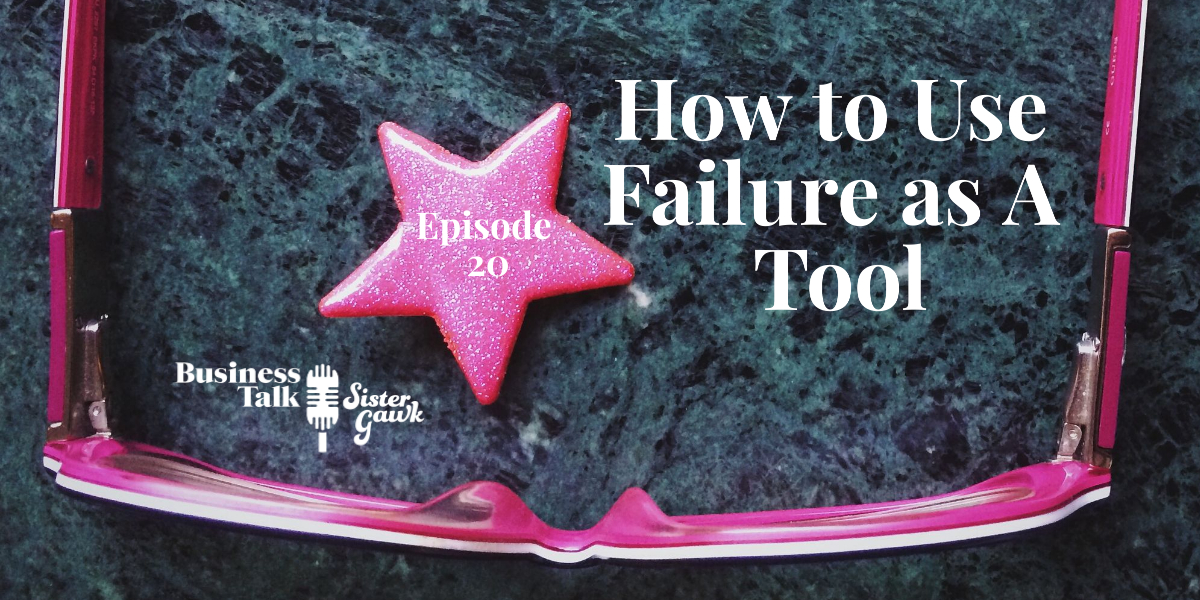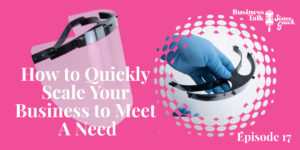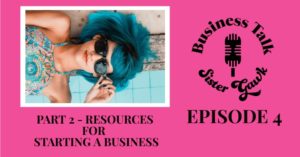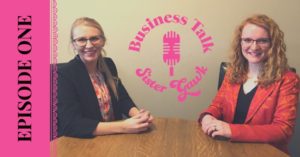In this episode, we address failure in understanding how it can benefit us and a few resources we recommend to help you push through failures. We share some failures that we’ve had, and discuss what you can do to prepare better for the next time you get up to try again.
Learning From Other People’s Failures In Entrepreneurship
Today we are finishing up the third part of our three-part series on failure. We are specifically going to be focusing on how to use failure as a tool. The first thing we have on our list is failure actually makes us more valuable mentors. Ruthie has a lot of examples of this so she’s going to talk just a little bit about it.
Ruthie: When I think about the people who have really influenced me in my life and in the way that I run my business a lot of them have come from a substantial amount of failure. The main one that I can think of is Dave Ramsey how he went through being totally broke twice and had to fight through that. There are so many different examples of people who are now seen as such credible sources because of the experiences that they’ve had. Maybe not at the time they were in those experiences and feeling like they’re failures, but as they came out of that. They learned from those failures and they use those failures to propel them forward. Because of that they really became voices and authorities on what not to do and what to do moving forward.
The other people that I can think of that have been really impactful in my life has been my parents and just the ways that they have faced failures in their own lives and taken them in stride and learned from that and made changes in their lives to just move forward and be able to minister to people because of those failures. I think that failure is such a good teacher and allows you to be able to speak sympathetically and empathetically into other people’s lives because you’ve been there, you’ve done that.
I think you’d be a lot more difficult in business to have a mentor who had never had any form of struggle who had never had to seek help from anyone because they just knew everything. They could just do everything. I think it would be a lot harder to learn from them to some degree. You can definitely learn from their successes and things that they’ve triumphed in, but I think it would be harder to relate to them on an emotional level. Failure makes you a more valuable mentor and now Bekkah is going to tell us about the value of reported failures from your customers in the form of Google reviews.
Managing Customer Service Failures in Business
Bekkah: As a business owner a lot of times what we don’t even realize is that there’s something that’s happened or something that’s gone wrong in communication or whatever especially if you have employees and the more people you have you don’t have your fingers on everything all the time. Sometimes people leave negative reviews on your business listings because of it. That actually isn’t something that you should take as “he said she said I’m just going to move past it” or “I’m just going to blame the customer for being crabby.” Those are legitimate opportunities to figure out what’s going on within your business that needs to be improved. It’s also an opportunity to show how to respond in a polite way to other people by trying to make it right and having great customer service. Even in things that are a little bit controversial.
Recently I saw an ad for a car dealership on social media. I know this business. I’ve seen him around a little bit. In the ad, they were said, “We’re having a deal blah blah blah.” Because it was a Facebook ad there’s an opportunity for people to comment on stuff. I was so curious to see what people thought of their ad. One of the people on there wrote, “There’s no way I’ll ever buy a car from you guys! Your prices are so expensive! blah blah blah” The dealership responded I don’t remember exact words but it was something like, “Well no one’s ever accused the dealership of being too cheap.” That’s so true! If someone’s really upset at the fact that they just can’t afford your product even if they want it. It’s not a time to say, “Well, stinks to stink!”It’s a time to say, “You know this is where we’re ascribing value because we need to be able to be a profitable business. I’m so sorry that that’s not a good fit for you right now.” And then offering options for something else for the. And tell them that there are a lot of free resources you have here and still try to provide value but not letting that person just suck your time. That’s a good way to think about it.
Managing Negative Customer Reviews of Your Business
When it comes down to a physical product and somebody had a bad experience with something that you sold them, contacting them trying to make it right or managing a return all that kind of stuff will majorly help you! You can do that digitally. Even just owning up to like a mistake and saying, “We’re so sorry that we got that wrong. Let’s try to make that right! Contact us here. We’ve created an item ID number to address this concern case that you have.” Or something similar to that. Then you can keep them organized in complaints if you have multiple. Customer service is something that you can learn so much about your failures because when you do make it right you win someone over more than 50% of the time. Sometimes your crabbiest customers can actually be your best customers for giving referrals later on when you resolve their issue.
Ruthie: From a digital marketing perspective Google actually will rank you higher if they see that you’re engaging with your customers in Google reviews, if you have a lot of responses to people’s reviews That can be an opportunity to capitalize on failure as well. If you see a negative review then you can respond to it. Also people users will see your business as more credible if you have not exactly five stars. It looks really fake you have a perfect five stars but if you have 4.8 or 4.3 or 4.7 or something like that, users actually see that as more credible because they think, “Oh they do have some negative reviews.” That’s just a little interesting tidbit based on research that I’ve done. One thing that also ties into what we were talking about is failure provides a reality check to where you’re at. Failure helps you take a step back and say, “Okay, what are we doing?” Maybe that’s going back to whether you are really adhering to your core values? Is this failure evidence that we are not doing what we set out to do and how can we adjust so that we’re back up to par?” That’s definitely a value of failure.
Failure Shows You How to Do Better the Next Time in Business
Bekkah: Another part of failing at something that can be a benefit is figuring out, “How can I do it better next time?” Because there’s going to be things that when you first do it you might not be the best at it but it doesn’t necessarily mean it was an epic loss. It could just mean that you address a situation and say, “I put this together and it looks okay but it’s not exactly how we wanted it.” If you hold back. We talked about last episode Ruthie being afraid of posting a video if you just keep trying and then never move forward with anything you’re never going to improve! The fear part is what is going to keep you from improving and continuing. You just have to try.
Data on your failures will help you know what you can do better next time! Whether that’s posting on social media and then checking your metrics or seeing that this one did really you can ask yourself, “Why is that? Because we cross-promoted, or because we had other people share it.” Knowing what your audience is engaging in is going to really help you understand that there are some things that actually are failures but this one wasn’t. This was good. In general, it’s okay to have those failures because then you start understanding your audience and learning those different things about how to use the tools that are there. That’s with any part of the business. I know a lot about marketing so I always use those examples but it can be any kind of failure. Trying a new process for your company to streamline things or whatever.
Sometimes there are things that just happen and you realize, “Oh my goodness! We totally messed that up and we should restructure the way we’re doing this!” It’s sometimes simple things like this temperature is too hot and it’s burning this and affecting this so we need to move those things or whatever. Manufacturing is completely different than providing a service. A couple of resources that we wanted to mention because we know that sometimes when you face failure, it doesn’t really feel like you want to use it as a tool. You think, “I’m done. I don’t want to keep going to forget this! I don’t know why I tried. One of the resources we’re going to recommend checking out is a book called “Do Hard Things” by Alex and Brett Harris. It actually has a foreword by Chuck Norris! If you’ve ever enjoyed a good Chuck Norris joke, you should definitely check this book out! The forward is not as funny as you think it’s going to be.
Ruthie: Check the blog post for some Chuck Norris jokes. We’ll throw some in there.
Bekkah: I read this book in high school. It’s so chock full of data and I was thought, “Yeah! Yeah, I can do this! There are great case studies talking about how you do these things. The sub book title of the book is “A teenage rebellion against low expectations.” After I read this book I was like, “Oh I’m going to do this! I am going to do the hard stuff!” One of the things that I thought was the most intimidating thing I could possibly do was sign up for precalculus in a college class online. I was determined to do this. At the same time, I also started a job that I had to be there full-time, 24/7 on-site for two weeks as the summer ended before the school year started, and because college classes aligned with that I missed the first two weeks of the calculus class. When I finally started a class I was, “Gah! Oh my word! This is so hard! I’m so behind!” Basically, the professor said, “Here is a 600-page book. Read it. There are two exams and eight homework assignments. Hope you don’t fail.” And I thought, “I’ve never done this before!” There were no lectures because this was when online school was just starting out and they were just trying to figure it out!
It was literally like read the book and hope you know what you’re doing. That was really emotionally hard for me and I was frustrated thinking that I couldn’t do it! I cried so many times trying and I just felt like it was hopeless to try to catch up! I talked to my mom about it and then she said, “Well, you know for college classes there’s a drop date and then after a certain date you have to withdraw and it goes on your transcript so if you need to drop it you need to do it soon.” I was like, “Okay! I can’t do this! I can’t do it!” So I dropped the class and was thought, “Hot dang! That was that was way too hard! I am such an idiot! I just started! I’m so motivated and then I just failed! What am I going to do with this?” But I realized that I needed to evaluate.
Evaluate Failures to Understand What You Can Do Differently in Order to Succeed
First of all, I needed to evaluate what I could have done better. I thought, “Well, first of all, I should probably start the class on time and not two weeks late and be behind before I even start.” That’s what I can do better. So then the next semester I was like I’m going to take this class again. I’m signed up for it. I’m doing it but who else can I get on board to figure out how to help me do this so I can succeed.
I started looking in my community! In the church that I went to there was a guy who was an engineer and I asked him if he could meet with me once a week and help me with my homework. He was very gracious and said yes which seriously was probably the nicest thing somebody could have done at that time. I made it through that class! The first test I got a C- and I just about threw up. I thought, “There’s no way! If I get a C- or if I get a not passing grade on the next one I’m done. I’m done with this class! I can’t! I’ll fail!” But I kept reading the book and trying to practice and I watched so many YouTube videos it was ridiculous.
Ruthie: Is this right when Khan Academy was coming out? I think I remember when Khan Academy was just coming out and you were totally on board with that and used Khan Academy all the time.
Bekkah: There are so many math hack apps out there and different videos. I would watch so many different YouTube videos on math it was ridiculous. I passed the class and that was incredible because it was pre-calc which was very hard for me! I thought, “Okay, well in order to not take this in college I have to take calculus, too. So I took calculus the next semester and by then online education was figuring out how to do things better and they actually had lectures. Woohoo! Surprise, Surprise! Then things got so much better and it was so much easier because the educational videos were great and matched with the material. I passed it with a pretty good grade. I learned to do hard things, yes, but like don’t be surprised if you fail. Then figure out how to succeed off of that.
Figure out how you can re-strategize, pick up, and go again. The next book we wanted to recommend as a good read is by Malcolm Gladwell it’s called “David and Goliath: Underdogs, Misfits, and the Art of Battling Giants” This book I really liked by him because he does a lot of data research as well. He also talks about different people who have specifically overcome major challenges and pushed through things. I learned a lot about the actual advantages of some people to learn certain ways because of a disability that they have.
One of the examples he gives in the book is that someone with dyslexia had a really hard time reading but they had a very strong ability to hear things audibly and understand them and do things with it. He talks through a lot of underdog stories. I think it’s an encouraging read if you’re feeling like you’re in a place where you should just give up. This is another good book to read because it definitely has stuff in there that makes you think about how it actually takes a long time to succeed but you can do it if you just keep getting up and pushing a little every day. Those are my recommended reads for you guys today to get past that feeling of discouragement.
There is No One-Shot-World in Business
Ruthie: Basically reiterating what Bekkah just said with that really good example and just taking a step back and saying, “What have I learned from this and how could I do better next time?” We don’t live in a one-shot world. You don’t only get one try and then you’re done and you have no other opportunities to succeed again. I find that really hope giving I think and something that you can hold on to and come back to again and again. It’s so good to be able to say, “If I did not succeed or achieve the level of success that I set out to do, there are going to be other chances and I can attempt this again and I can work at this again.”
Obviously, there are some times where you might not get that exact same opportunity again but you have other opportunities that you can capitalize on to achieve your goals. I think that there’s so much self-exploration that happens with failure and learning more about yourself. For me, that has looked different in a lot of ways but specifically, with trying to figure out scheduling and things like that, I have to find something that works for me. The more I’ve learned about myself the more I’ve been able to set goals that, first of all, are realistic but then what I look at next is how is this making me push out of my comfort zone and doing those harder things? Thinking about this podcast, it’s challenging, you know? We’ve learned so much from it!
Our very first episode we recorded with a woman named Abigail Carpenter from Abba Gabba and we had the mics turned down all the way. This was Pre-COVID so we were meeting with a girl and interviewed her, we’ll have her back on the show later on but we interviewed her and had our mics turned down all the way. You could hear nothing.
Bekkah: That was the worst! That was so embarrassing because we said to her, “Oh yeah! We got it! Thanks so much for joining us!” Then she drove home and then we’re like, “Ah, dang. We just destroyed this entire recording.”
Ruthie: I can feel myself blushing! I’m serious! My cheeks are hot! But that was definitely something that made us step back and say, “Ok, now we know. Check the volume on the microphone. Ok, good to know! Moving forward we learned from that and how now we know! Then we had more chances to capitalize on that and work on setting some processes in place.
I am a huge systems and processes person. If I can get a process down it’s so much easier for me to just crank it out and then I don’t have to sit in that procrastination thought process of, “I don’t know what to do! I don’t know how to start!” Figuring out a system and a process for me which works best if I just say, “I’m going to commit 20 minutes to this,” and then after 20 minutes I’m done. I’m checking out from this for the day and then I revisited again the next day. For just 20 minutes and then I have to stop at the 20-minute mark to keep myself accountable and not burn myself out every time I’m trying to pursue something. It’s that learning about yourself that comes from failure that’s really, really valuable.
Bekkah: I was just thinking about what are all the things that I have learned from failing at things? One of them is to remember to eat food when you’re working. Because at the end of the day, I’m like, “Why am I shaking? Oh yeah, I didn’t eat anything today.” Things like that! Knowing your body is really important to in understanding the failures you have or what triggers your emotional response to when you actually have a failure.
Failures In Life and Business Should Never Be Intentional
The last thing we learn to hit right before we jump into our Gawk section – don’t take this advice, please don’t take this advice as, “I should just go out and do something that I know is doomed to fail.” I don’t know how many times I’ve seen young people say, “Just let me make my own mistakes in life!” Yes, I understand what they’re coming from but at the same time if it’s something that you know is proven already to fail or be harmful, don’t do it. For example, vaping it will hurt your body. It’s been scientifically proven and they say, “Just let me learn from my mistakes by myself.” No, there are lots of people that have already had issues with that, it’s really bad, and you have asthma! I don’t want you to go out and live your life and learn from your mistakes because they’ll make you die. Rely on the advice of others who have experience and learn from their failures.
When we’re saying use this failure as a tool, use other people’s failures as a tool as well so that you don’t make the same mistakes. It’s so much more valuable when you saved so much time and made your efficiency so much better when you’re not wallowing in the emotion of the failure because you learn from somebody else.
If you enjoyed this episode from Business Talk Sister Gawk, share us with a friend!




